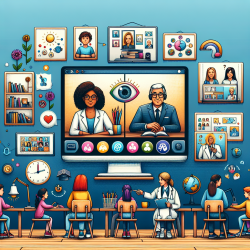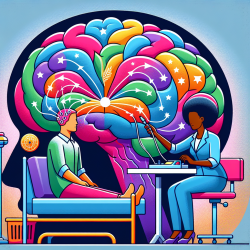In the evolving landscape of mental health services, virtual therapy has emerged as a transformative tool, particularly in educational settings. As mental health professionals working in schools, it is essential to understand the nuances and benefits of online therapy. TinyEYE, a leader in providing online therapy services to schools, is at the forefront of this movement, ensuring that students receive the support they need, regardless of geographical limitations.
Virtual therapy, also known as teletherapy, leverages digital platforms to deliver mental health services remotely. This method has proven to be particularly effective in schools, where the demand for mental health support often exceeds the availability of on-site professionals. By integrating virtual therapy into school systems, mental health professionals can address a broader range of student needs more efficiently and effectively.
Benefits of Virtual Therapy in Schools
Virtual therapy offers several advantages that make it an ideal solution for schools:
- Accessibility: Virtual therapy breaks down geographical barriers, ensuring that students in remote or underserved areas have access to quality mental health services.
- Flexibility: Online therapy sessions can be scheduled around school hours and other activities, providing greater convenience for both students and therapists.
- Cost-Effectiveness: Implementing virtual therapy can reduce costs associated with travel and on-site services, making it a more economical option for schools.
- Privacy: Virtual sessions can offer a higher level of privacy for students, encouraging them to engage more openly in therapy.
- Resource Optimization: Schools can optimize their resources by employing a combination of on-site and virtual therapists, ensuring that all students receive timely support.
Implementing Virtual Therapy in Schools
For mental health professionals looking to implement virtual therapy in schools, several steps can ensure a smooth and effective integration:
- Assessment of Needs: Begin by assessing the specific mental health needs of the student population. This will help in tailoring the virtual therapy services to address the most pressing issues.
- Choosing the Right Platform: Select a secure and user-friendly platform that complies with privacy regulations such as HIPAA. TinyEYE offers a robust platform designed specifically for school settings.
- Training and Support: Provide training for both therapists and school staff on how to use the virtual therapy platform effectively. Ongoing support is crucial to address any technical or procedural challenges.
- Engaging Students and Parents: Educate students and parents about the benefits and procedures of virtual therapy. Building trust and understanding is key to successful implementation.
- Monitoring and Evaluation: Continuously monitor the effectiveness of virtual therapy sessions and make necessary adjustments based on feedback from students, parents, and therapists.
Challenges and Solutions
While virtual therapy offers numerous benefits, it is not without challenges. Here are some common obstacles and strategies to overcome them:
- Technical Issues: Ensure that both therapists and students have access to reliable internet connections and appropriate devices. Technical support should be readily available to address any issues promptly.
- Engagement: Maintaining student engagement in a virtual setting can be challenging. Use interactive tools and techniques to keep sessions dynamic and engaging.
- Confidentiality: Ensure that virtual sessions are conducted in private settings to maintain confidentiality. Educate students and parents about the importance of privacy during sessions.
- Adaptability: Be prepared to adapt therapy techniques to fit the virtual format. Flexibility and creativity are essential in delivering effective virtual therapy.
The Future of Virtual Therapy in Schools
The integration of virtual therapy in schools is not just a temporary solution but a long-term strategy that can revolutionize mental health services. As technology continues to advance, the potential for virtual therapy to provide comprehensive and accessible mental health support will only grow. Mental health professionals must stay informed and adaptable to leverage these advancements effectively.
At TinyEYE, we are committed to supporting mental health professionals in schools by providing innovative and effective online therapy services. By embracing virtual therapy, we can work together to create a more inclusive and supportive environment for all students.
For more information on how TinyEYE can help your school implement virtual therapy services, please visit our website or contact us directly.










